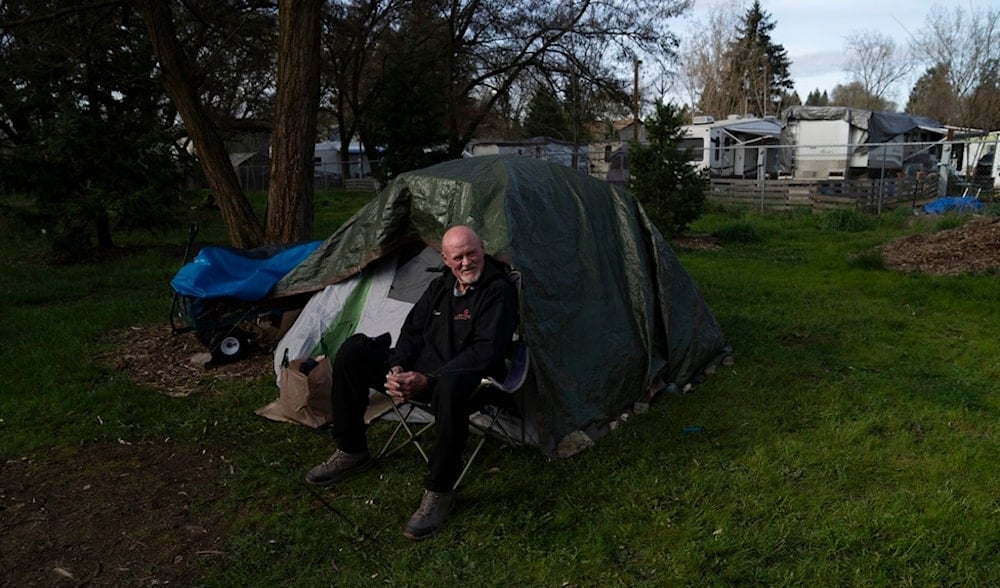US homelessness sees 18% rise, hits peak record
Homelessness across the United States has hit new records, diminishing efforts to curb the phenomenon that has persisted for a decade.
-

David Wilson sits outside his tent at Riverside Park in Grants Pass, Ore on March 21, 2024 (AP)
The United States has grappled with an 18.1% rise in homelessness this year, largely due to a lack of affordable housing, natural disasters, and an influx of migrants, according to federal officials on Saturday.
Compared to the 12% rise in 2023, data collected by the Department of Housing and Urban Development (HUD) showed over 770,000 people counted as homeless in January, excluding those staying with friends or family. Reasons for homelessness have been attributed to rising rents, the end of pandemic-related assistance, and a surge in first-time homelessness.
The data also highlights racial disparities, with African-Americans comprising 12% of the US population but accounting for 32% of the homeless population. This further indicates the drastic rates of poverty among the population, accounting for 21% of the African-American community.
Among the most alarming trends was a nearly 40% increase in family homelessness, significantly influenced by the influx of migrants in major cities. In 13 migrant-affected areas, including Denver, Chicago, and New York City, family homelessness more than doubled, while it rose by less than 8% in 373 other communities, according to HUD. Additionally, nearly 150,000 children were homeless on a single night in 2024, marking a 33% rise from the previous year.
The rise in homelessness has also been driven by disasters, notably the Maui wildfire, which left over 5,200 people in emergency shelters in Hawaii during the count. Renee Willis, interim CEO of the National Low Income Housing Coalition, attributed the increase to insufficient investment in affordable housing and protections, warning that high housing costs continue to push more people into homelessness.
The most populated state, California, continues seeing the largest rates of homelessness, followed by New York, Washington, Florida, and Massachusetts.
Robert Marbut Jr., former head of the US Interagency Council on Homelessness, criticized the nearly 33% rise in homelessness over four years as "disgraceful", urging a shift away from focusing solely on permanent housing to addressing substance abuse, mental illness, and job training.
Although the US had previously recorded a steady decline in homelessness for about a decade, the past 20 years have shown spiking increases, highlighting the crisis challenging the country.
US Supreme Court under scrutiny for criminalizing homelessness
Meanwhile, communities, particularly in Western states, enforced camping bans amid public concerns over safety and sanitation. This follows a Supreme Court ruling affirming that outdoor sleeping bans do not violate the Eighth Amendment, though advocates argue such measures criminalize homelessness.
Crowds gathered in front of the US Supreme Court in light of the ruling, holding banners that said "Housing Justice," "Housing Not Handcuffs," "Housing Dignity," and "Housing Solves Homelessness."
Hannah of Food Not Bombs DC told Sputnik how the group sees that homelessness should not be a crime.
"We don’t believe that if you find yourself one day without anywhere to go, without shelter space, you are not a criminal and we should not be treating people that way," she said, expressing hope that making homelessness a crime goes against the Eighth Amendment due to the current proceedings.
78-year-old Nathylin Flowers Adesegun, one of the leaders of the advocates against homelessness Vocal NYC, told Sputnik that the Supreme Court hasn't acted for 40 years about housing the homeless but now acts in the opposite direction.
“Now they are making it a criminalization to be on the street in the USA. Just think about that, they charge you more money [for rent], they arrest you, and criminalize you because you are poor and homeless. That’s wrong at every level,” Adesegun said.
Read more: New LA mayor declares state of emergency amid homelessness crisis

 4 Min Read
4 Min Read








